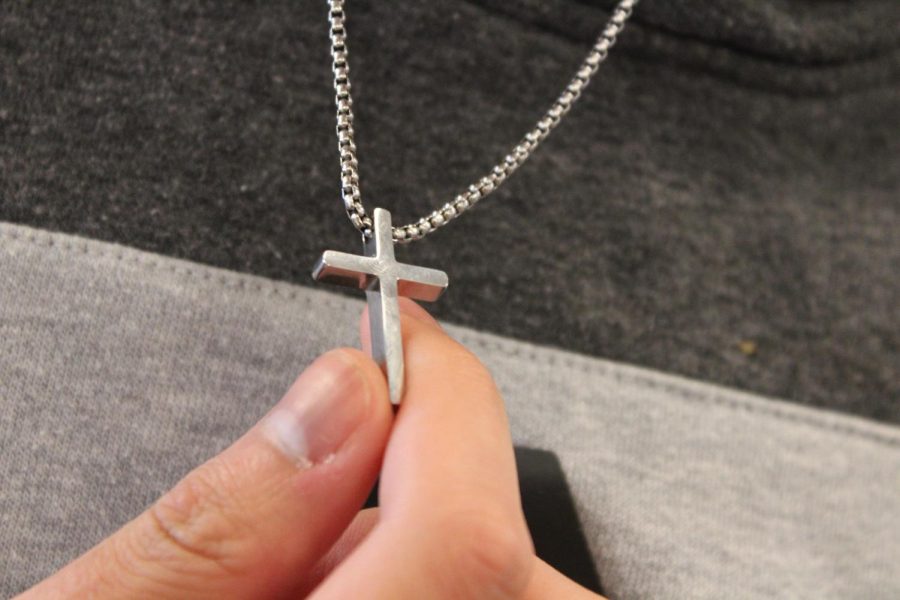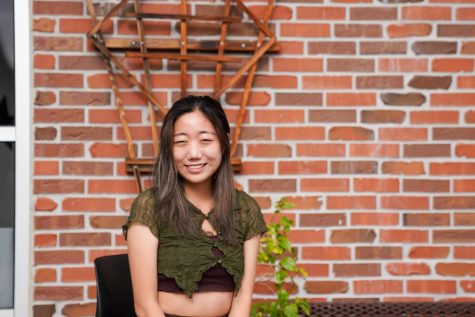Looking to a higher power
The MVHS community voices their perspective on religion
Senior Daniel Yang holds his cross. He wears it every day as a part of his faith.
October 7, 2022
Hands clasped and head bowed, he could feel the tinted sunlight graze the nape of his neck. Raised with devout parents, he had attended church every Sunday that he could remember, and it was under the cross where senior Daniel Yang said he was saved.
Religion was embedded in Yang’s early life: he watched his parents pray regularly and he went to Sunday School — both to learn about God and to hang out with his friends — but it wasn’t until he attended his church’s altar call at 8 years old that he realized what it meant to be Christian. Yang describes the moment as when he made a conscious decision to follow Christianity with the belief that “Jesus died on the cross for your sins.”
Yang was baptized at 13, and followed his faith piously throughout middle school. However, leading into high school, Yang began to question what he truly believed and his own morality. He turned to God for guidance on certain issues while also flipping through the Bible and seeking guidance from members of his church.
“I think high school is the time where people just search for answers,” Yang said. “[There] was a lot of stuff I was not sure about and I really wanted to find out, ‘Do I still want to believe in this?'”
High school was also a period of reignited faith for Yang — through his curiosity and his renewed interest in religion, he felt a stronger connection with God than he had ever before.
“I went through a lot,” Yang said. “I feel when you’re at rock bottom, the only thing you have left to do is trust God. And then in high school, I think I started to feel that God was actually real, [that] he had an active role in my life. [The idea] that there was someone out there who really cared for me was really comforting, and it just became a lot more real to me.”
Economics teacher Pete Pelkey emphasizes the importance of religion in society, stating that its presence confirms that we’re not just “random accidents” and that there’s a reason for our existence.
However, to senior Ishita Pesati, religion is less of a belief than a community — her memories revolve around the multi-colored candles and fireworks that light up traditional Hindu festivals, the colored powder thrown during Holi and the dances that created a lively and culturally engaging environment.
“Religion has been a big part of my identity especially in high school because [I’m] surrounded by so many [people] that follow the same religion,” Pesati said. “So there’s many cultural events that are widely celebrated here, so I’ve learned to embrace it — it’s like a family.”
For Government teacher Ben Recktenwald, however, being raised in a household tied to no strict religion led to a freeform exploration of different faiths, eventually allowing him to realize that the “idea of some almighty being out there running everything” didn’t resonate with him.
“It just never clicked in my head,” Recktenwald said. “I feel [religion] is more of an idea where people feel a need to be part of something greater. I think there’s some people who feel a need to have some kind of an authority figure or someone that can basically give them direction and purpose.”
Atheism has been steadily rising among the younger generation, which junior Lemon Liu attributes to religious trauma among the older generation who now raise their own children religiously looser. Liu personally attributes their own lack of faith to the concept of free-will, the idea that there isn’t a higher power controlling their actions, emphasizing living with self-inscribed principles.
“Ultimately, it’s not something that I connect with,” Liu said. “I never really believed in a higher power that has control over what [I’ve] done, because it’s not something that you can touch or see [or] talk to. I’ll try my best to do what I can do and not rely on other things.”
Liu has found that this belief has “loosened” their morals and has helped them become more accepting of other perspectives and religions alike. Additionally, atheism grounds them and helps them view situations more realistically.
“I think about my own consequences and my own actions a lot more,” Liu said. “[And] if I make a mistake, I [won’t] be like, ‘Oh, it’s like a deadly sin.’ [Rather,] I would forgive myself more and not think that someone else would forgive me for what I have done wrong.”
Unlike Liu, who felt that their belief system strengthened their morals, Recktenwald struggled with his morality as he believes that most people derive their sense of right and wrong from religion.
“I was like, ‘Well, does that mean being atheist makes you inherently immoral?'” Recktenwald said. “I came to the conclusion that — hopefully [this] doesn’t offend anybody personally — someone who does the right thing because they’re afraid of being punished, isn’t doing it because it’s the right thing to do — they’re doing it because they’re being told that they’ll be punished if they don’t. And I feel that in my mind, I do things because of the right thing to do, not because anyone told me I had to. And I feel that in some ways, it makes me more of a moral person.”
Recktenwald defines religious extremism as someone who uses religion as a way to force others to do what they want, oftentimes with violence — which he personally thinks is “ridiculous” because most religions stem from kindness towards others — or through the passing of theological laws.
“There are people who are saying, ‘We’re going to pass laws that say, you have to do this [or] we might do something to oppress you,'” Recktenwald said. “That is obviously a huge problem. But if somebody wants to stand on the street, holding a sign, saying that ‘You’re a sinner if you don’t follow Jesus.’ Sure, why not? It’s a free country, free speech or religion. But [if] you’re not giving people a choice and you’re forcing them to do what you’re telling them to, I see that just as the same thing as a dictatorship.”
Yang notices there are many Christians who hold values he personally disagrees with, especially those that are right-winged almost to an extremist level, which to him isn’t the way “God intended it for it to be.” He believes that these people create a stigma around Christanity due to their increased exposure in the media, and feels that when he tells people he’s Christian, they automatically assume stereotypical things, leading to a feeling of frustration.
He also disparages church members who abuse their power through sexual assault and other forms of exploitation, calling them “sh*tty people” that cause a sense of disillusionment to his faith.
“It’s a really big part of me thinking, do I really want to pursue Christianity?” Yang said. “Is it worth my time if people just become this? And the way I think about it now is there are a lot of really, really good Christians out there, people that I really look up to, and you know, you don’t become the people who are not good. [Rather] you strive to be the ones that are better.”
Pelkey acknowledges that bad actors such as Al Qaeda have used religion as a justification for unjust bloodshed, but also points to other bad actors such as Mao ZeDong, Stalin and Hitler, who were all faithless.
“[Some] atheists love to point out all the bad things that have been done by religion,” Pelkey said. “And that’s true, it has been done, religion is taken by groups and twisted to basically justify any kind of horrendous thing that happens. But if you acknowledge that as truth, and you should acknowledge this as the other truth, look at all the acts — the acts of compassion.”
To Pelkey, religion is “one of the world’s greatest things” because “we’re serving something greater than ourselves.” Similarly, Yang finds that he gives meaning to religion and in turn religion gives meaning to his life.
“I feel like [religion] gives me a sense of self worth,” Yang said. “I know that no matter how many times I fail, no matter how sh*t I feel, God [will] always love me.”





























